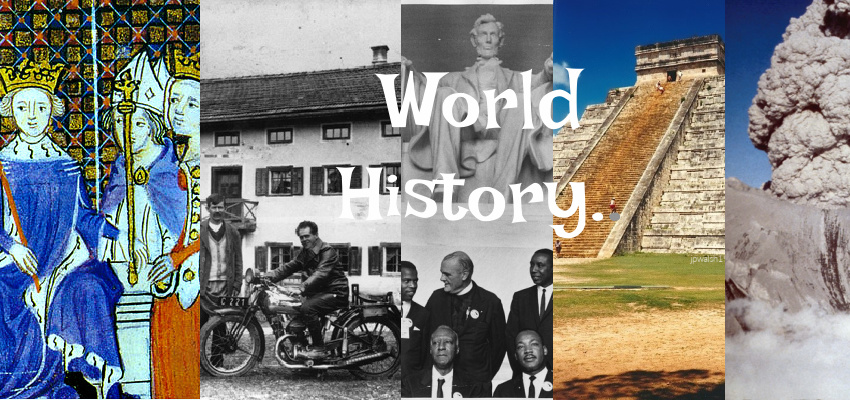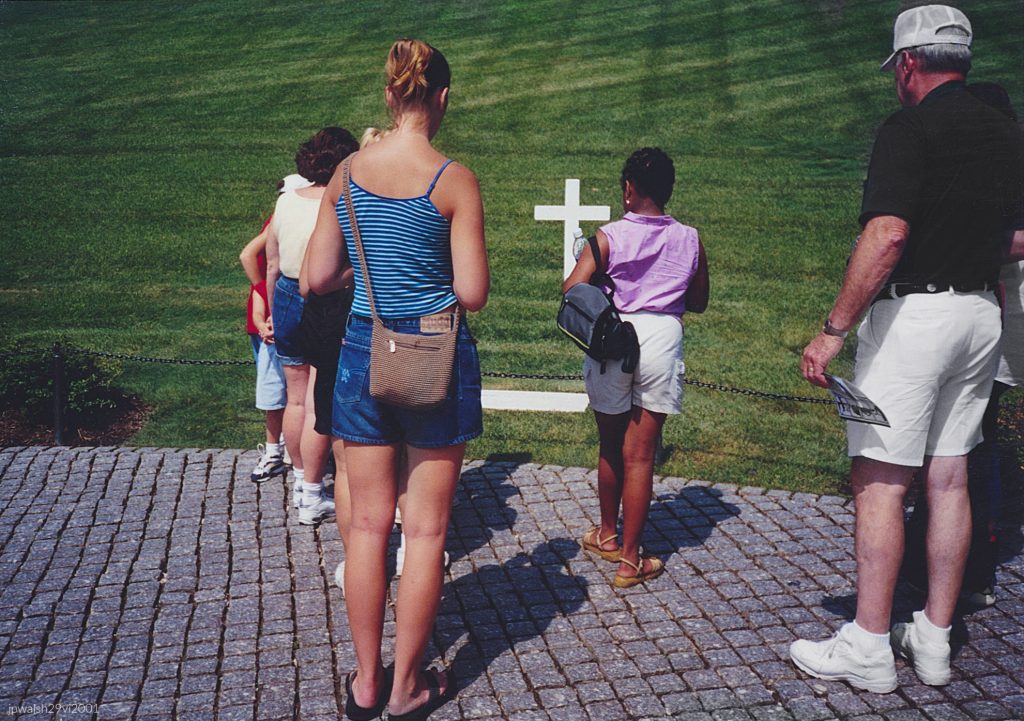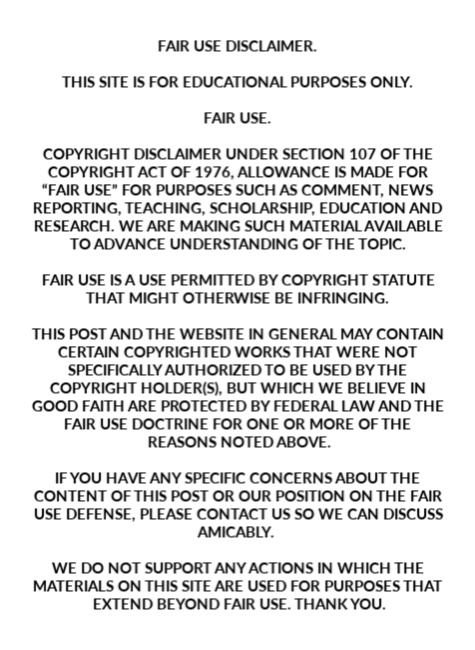
FEATURE image: “‘Some men see things as they are, and say ‘Why?’ — I dream of things that never were, and say, ‘Why not?”” by gwilmore is marked with CC BY-NC-SA 2.0.

PHOTO CREDIT: “No Known Restrictions: Robert Kennedy Speaks to Civil Rights Demonstrators at Justice Department by Warren K. Leffler, 1963 (LOC)” by pingnews.com is marked with CC PDM 1.0.
By John P. Walsh
It was fifty years ago today (June 8, 1968) that Senator Robert F. Kennedy had his funeral in Manhattan and a train procession to Washington D.C., for his burial after being shot on June 5, 1968 after winning the California Democratic primary for president of the United States. His assassination, funeral, and the long train ride to Arlington National Cemetery are seared into the national memory as well as my own who heard and watched on radio and television all these historic events unfold as a child. It is a memorable series of life-changing happenings for the nation, similar to when President Abraham Lincoln was assassinated and his long funeral train procession from Washington, D.C. to Illinois took place in 1865. Before Lincoln’s funeral train went on to its final destination of Springfield, Illinois, the president’s body lay in state in Chicago. There, as it experienced in its other stops across several states, throngs greeted the Civil War president and, as History would have it, my great-grandfather who was in the Union army at that time served as one of Lincoln’s honor guards.

On June 8, 1968, brides and bridesmaids tossed their wedding bouquets at RFK’s funeral train when it passed in order to make their final good-byes. Though weddings and funerals are very different, they have similarities for being one of humanity’s great milestones, a significant rite of passage, where what was or has been, has died and what lies ahead is mysterious.
History records that one of RFK’s favorite songs was Where have all the flowers gone?, the modern folk song written by Pete Seeger which became a big hit, a number one musical sensation, in 1962, when RFK was Attorney General of the United States. The song is its own meditation on life’s transience – with its carriage of universal mortality – and whose lyrics, which Bobby Kennedy’s intuition understood perhaps more than he knew – grew more and more prophetic as the 1960’s moved forward.
Where have all the flowers gone?
Long time passing
Where have all the flowers gone?
Long time ago
Where have all the flowers gone?
Girls have picked them every one
When will they ever learn?
When will they ever learn?
Where have all the young girls gone?
Long time passing
Where have all the young girls gone?
Long time ago
Where have all the young girls gone?
Taken husbands every one
When will they ever learn?
When will they ever learn?
Where have all the young men gone?
Long time passing
Where have all the young men gone?
Long time ago
Where have all the young men gone?
Gone for soldiers every one
When will they ever learn?
When will they ever learn?
Where have all the soldiers gone?
Long time passing
Where have all the soldiers gone?
Long time ago…

In the JFK Library in Boston, there’s a multi-page document which is RFK’s campaign schedule for president from June 7 to June 17, 1968. In the last 10 weeks the candidate had won four out of five state primaries he entered – in the Midwest (Indiana, Nebraska, and South Dakota) and California. Typed and single-spaced for over 11 pages, it became immediately moribund with his unexpected and premature rendezvous with death.

On June 7, 1968, Senator Kennedy of New York was not to be lying in state at St. Patrick’s Cathedral in Manhattan but on a 6 a.m. flight from L.A. to St. Louis for a luncheon with convention delegates. He then was to fly to New York State for a flurry of campaign appearances starting at Niagara Falls which would literally take him working into the early hours of the next day. On June 8, 1968, RFK was not to be funeralized with a train procession to follow for burial at Arlington, but making campaign appearances all over New York State from dawn to dusk. On June 9 he was not to lay silent on a hill below Custis House, not far from his brother, the slain 35th President of the United States, but…


Perhaps RFK’s legacy for Democrats in 2018 and beyond is not that, as many insist, the New Deal Democratic coalition died along those rails on June 8, 1968 – fifty years ago today – but that it continues inherently with every progress and advancement made in society and, importantly, from and for all sides of American life. RFK’s brand of American politics for the Democratic Party is one that looks to include more of a wide array of political viewpoints than one would easily imagine possible or manageable. On June 8, 1968, Cecil Smith, of Charleston, South Carolina, was quoted in The Washington Evening Star as calling Kennedy “a wonderful man — a man of everybody.” Kennedy would never stop trying to govern from a grassroots political perspective which is creative and critical of extremes or mere pragmatism on behalf of the noble pursuit to be elected to high office so to effectively lead a diverse and great nation into a better future for all.

In today’s moribund politics of division, RFK’s ideals for America were no less difficult to achieve in 1968 than in 2018 – or beyond. After RFK was killed, an already-polarized presidential election of 1968 led to a predominance over the next fifty years of a strong brand of partisan politics. Kennedy’s more inclusive approach turned up historically truncated and, with decades of often mean-spirited political partisanship, is even chafed at as exotic or, at least, futile. Yet that Kennedy brand of democratic politics would never accept such defeatism then or now.

RFK’s at the podium to deliver a victory speech following the outcome of the California primary. These last words of 42-year-old Senator Kennedy to the American people, given shortly after midnight on June 5, 1968, and literally moments before he was shot, speaks volumes to his governing approach for the future.
Its vision absolutely requires the many and diverse hands, voices, and votes of the American people to accomplish, which was true in 1968 and today.
“What I think is quite clear is that we can work together in the last analysis. What has been going on in the United States for the last three years – the divisions, the violence, the disenchantment with our society – the division, whether it’s between blacks and whites, the poor and the more affluent, or between different age groups or the war in Vietnam, that we can start to work together, that we are a great country, an unselfish country and a compassionate country. And I intend to make that my basis for running over the next few months… The country wants to move in a different direction. We want to deal with our own problems in our own country and we want peace in Vietnam…The fact is all of us are involved in this great effort – and it’s a great effort not on behalf of the Democratic Party – it’s a great effort on behalf of the United States – on behalf of our own people- on behalf of mankind all around the globe and the next generation of Americans… What we are going to do in the rural areas of our country? What we are going to do for those who still suffer in the United States from hunger? What we are going to do around the rest of the globe? And whether we are going to continue the policies that have been so unsuccessful, in Vietnam of American troops and American marines carrying the major burden of that conflict I do not want to and I think we should move in a different direction. So I thank all of you who made this possible this evening, all of the effort that you have made, and all of the people whose names I haven’t mentioned but did all of the work…So I thank all of you…And now it’s on to Chicago and let’s win there…”




Visitors at RFK’s gravesite, Arlington National Cemetery, Arlington, Virginia, June 2001. Author’s photograph.





